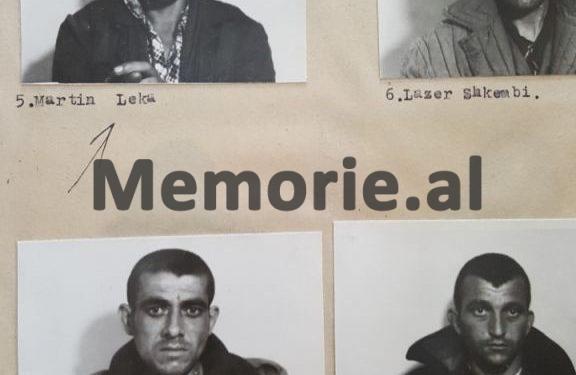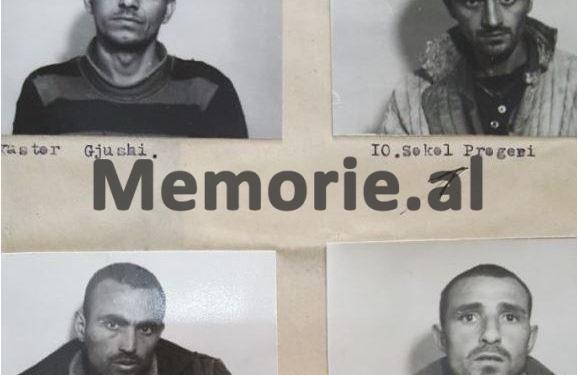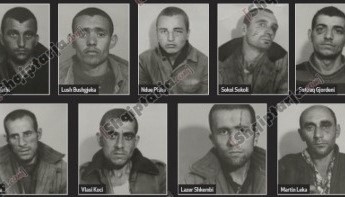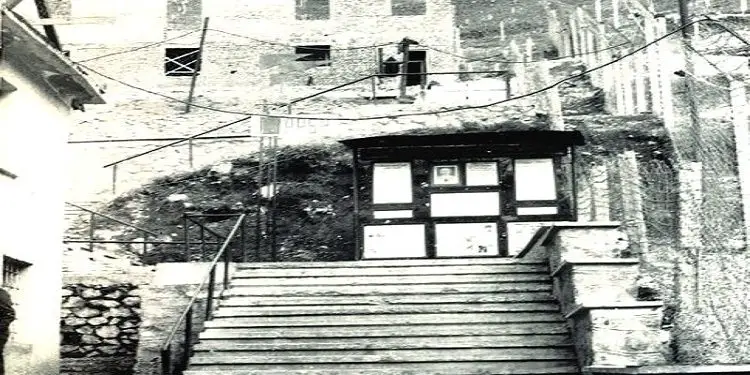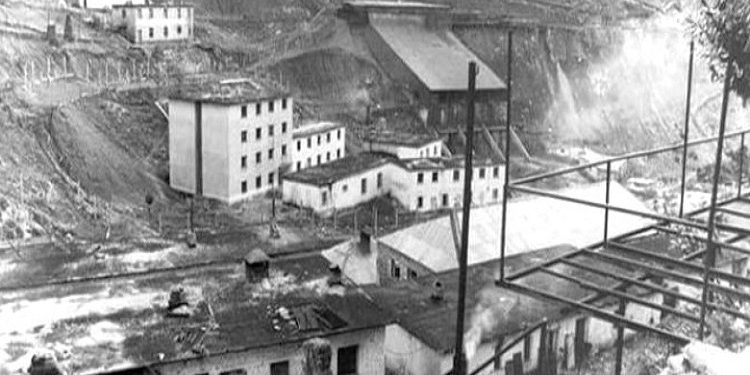By Skënder Tufa
Part Three
Memorie.al / After the amnesty of 1982 and after the murder of Rexhep Geci, the situation worsened further in Spaç prison, where the police began to tighten internal regime measures with schedules, food lines and the extension of the waiting time on the terrace for appeal. At the end of January 1983, we were informed that part of Spaç prison would be transferred. A new prison had been opened near the Munelle mountain in Puka, called Qafë-Bari, and laborers were needed for exploitation. The strong and problematic workers were put on the list that would be sent to the Puka mine. The transfer of about 200 prisoners was a great hardship for them, as they had to deliver blankets, sheets, mattresses and dishes, such as; bowl, spoon and gourd, you had to take your personal belongings from the warehouses and get them ready for inspection.
On May 22, 1984, an event of historical importance took place there (the Qafë-Bar Revolt), which I think should be accompanied by the direct testimonies of the participants in it, to bring it as complete and closer to reality as possible. By collecting the pieces of facts expressed by the protagonists, a more complete vision can be created, which would resemble the restoration of a mosaic.
Continued from the previous issue
FATMIR LAKASI
“I arrived at Qaf-Bar prison, immediately after the amnesty of November 15, 1982. It must have been the end of December when we arrived. The cells were messy, dirty, with sweat on our feet and it took us some time to settle in there. The orderlies had been there before, who had been transferred, but not the Dibra police officers from Bulqiza prison, who had remained in service. I stayed with Astrit Avdo and Dëshir Çizme, and I had more company with Pal Brozi, Lek Frroku, Haxhi Benë and Dane Çiflik. We came from Ballsh Prison and had been brought here to work in the mine, where they put us the next day.
Without conditions, the long road, about 1.8 km., with water that when it rained outside, it seemed like it was raining inside too. In January of ’83, Spaç’s contingent included my friends with whom I had been imprisoned. For the first time, the five of us were together in the same prison, the brothers Talo, Ahmet and Skënder Tufa and I. I moved away from my old friends to join Ahmet and Skënder, with whom I enjoyed chatting more, but we also had many things in common.
The snow that fell two days before Spaç’s contingent arrived had cooled the temperature, which was very low in that place. We moved to the field to warm up and to relieve stress with the chats that circulated and also came from meetings with families. The prison was difficult, but the chief of police made it more difficult, who sometimes imitated cowboys and sometimes German SS men, not only with his hat raised on his forehead, but also with violent actions.
The first point was the norm, for which the policemen, acting on an order from the chief, attacked without mercy, while we had food, even the hungry, we could not eat the dried leeks that were moldy in the warehouses and often mice came out of the five-kilogram bags. To save bread, they compensated us with two small potatoes, which were sometimes green and bread with white worms.
I have heard a lot about the Qaf-Bar Revolt, which, under the conditions of the past terror, has not been fully explained how it happened. It is easy today to talk, but we who lived it, express regret when we do not hear it told correctly, what happened and how it happened?! The revolt could not have been carried out by only 12 people, but even those who were standing below the stairs, when we came out and clashed with the police, should at least have listened. The whole incident happened for an empty wagon!
This still seems surprising to me today, since the norm was over 120%. When we entered the canteen for roll call, the three of us; me, Ahmeti and Skënder, were together as always, sitting on a bench in the middle of the canteen. The camp Police Chief, Mond Caja, entered and provoked the police, attempting to take some prisoners by force. The hall was electrified and reacted with screams, the police were unable to stop the momentum that burst the gate and took the police forward. Initially, there were about 40 people, out of the 350 that the prison had, then the number decreased.
When the last fight took place, in pursuit of the police, to the door of the meeting, there were initially; Tom Ndoja with Martin Leka, Sokol Sokol, Petrit Moriseni, Lush Bushgjoka, Lazër Shkëbmi, Dush Martini, Kosta Gjordeni, Gurali Beshi, Skënder Tufa, Roland Tole, Vasjar Tabaku, Nuredin Skrapari, Llazi Koçi, while Haxhi Baxhinovski, who was debating with the deputy The commissar who was falling with the black hose on his head, were Ahmet Tufa, me, Agron Hoxha, Sali Gaca, Ramazan Spahiu, Dedë Nimani and some others, who with stones in their hands, were throwing stones at the officer, but not directly.
I shouted to you, saying: “Yes, throw them directly”, – and my brick fell on the officer’s back, and his hat fell off. A muffled revolver crack was heard. The bullet had hit the flesh. Then the automatic weapons cracked from all sides. For several hours the prison was in the hands of the prisoners, without police. The three of us had a lever that we had hidden in the ground. Meti opened the warehouse where a man was locked inside, who was monitoring what was happening. We changed our clothes.
We put on clean clothes, for anything that could happen, to be clean. Sali Gaca had made a hasude, from which we each took two cannons. I told you not to surrender, because these people will cause bloodshed. There were no more than 20-30 people up there. The first word was to resist, Skënder even went and filled up with water, so that when it was stopped, we would have a reserve. After the ultimatum of the deputy minister of the interior, those leading the revolt decided to surrender in order to save the others.
NDUE KOLA
“The police’s occasional harassment would have made even a donkey kick. They had brought it to our noses and that day I don’t know how it exploded, but when it exploded, the police couldn’t find a way to get in, because the prisoners’ anger was no longer contained. There was a physical fight and when we confronted them, they tried to trick us, once putting us in the canteen and once in the dormitory. When they couldn’t, they used their weapons,
injuring Kostandin Gjorden and firing automatic rifles into the air from all the guard posts, even from the command offices, which were fired with automatic rifles. For several hours, the prison was in the hands of the prisoners. Freedom within the wires, won with blood. No police inside the territory of the siege”!
DED MARTINI (DUSHI)
“What kind of beating?! Absolutely not, no policeman was hit, there were injured people in the barracks, the only problem was getting Sokol out of their hands, who was being beaten. The bricks we were throwing were hitting the wall. There were no serious injuries, they just want to make a fuss. A policeman and a prison commissioner were injured, there was a slight scratch. After they were surrounded, the police pretended to retreat and the matter was closed. Then they put us in a hall where we were eating bread.
At this moment they found the knives and started taking us out one by one, because they wanted to catch us. A lot of forces came. The bad luck of Kostandin Gjorden, a very suffering prisoner, who also had his arm broken by that bullet he received there. He was at the door, they grabbed him to take him out and started shooting him. The whole camp revolted there. Because he was a person dear, and then there was a spiritual revolt of all the prisoners, who broke down the door.
The revolt took on a massive development, and everyone was involved. The most savage fight with the police took place. Toma, had a brick in his hand and was hitting a policeman, who had put a prisoner down and was hitting him with a rubber baton…! The fight continued, helicopters came, and then they managed to separate the part of the camp. I told some friends to leave, and we stayed, who started the revolt from the beginning.
KOSTANDIN GJORDENI
“When they took me to the refectory, to send me to the dungeon, they hit me and I shouted, they took me to the dungeon beating me, while the chants burst out from the refectory; -free Kostë – they let me go and I joined my fellow suffering brothers, who took the policemen ahead. Tom Ndoja had some bricks in one hand and with the other he was throwing them to the policemen who were running away like cows! Behind him was Martin Leka, and I after them. Behind me came the others; Sokol Sokoli, Dush Martini, Ded Nimani Land Tolja, Skënder Tufa, Gurali Beshi and others, as I remember now.
From the guardhouse to the door, the soldier shot above our heads, to scare us, while the guard officer shot at us. He must have aimed at Toma, but we were moving quickly and the bullet hit me. I felt like a sting, not pain, only I was numb. – “The criminals shot me; the communists shot me” – I told my friends. Dushi took out a cigarette from his bag and the others put it to my wound. There, our blood started to boil, we shouted: – “Down with communism”
Then we surrendered, because we had nothing to do. They beat us like animals and, half dead, they sent us to Puka, there they made us interrogators, beating us with wood, which they gave us several times a day, and cursing us with vulgar language. They tried us within a few days and then sent us to Lezha, where they kept us there for a month and then transferred us to Spaç”.
BEDRI BLLOSHMI
“The guard officer was a Matjan, with the surname Kurti (Asllan), he shot Kosta”
PJETER LULI
“I was on crutches, because I had an accident and my leg was in a cast. The behavior of the police, led by the careerist from Mistrec, Edmond Caja, aggravated the situation to the point that the convicts were forced to defend themselves. At this time, my provincial governor and friend, Bajram Vuthi, told me: “Pjetër, I’m going to get these crutches, because the apocalypse is happening here”, and he used them when a policeman hit him on the head with a baton”.
BAJRAM VUTHI
“As soon as I went out the gate, a policeman kicked me, I got a few bruises, that’s good, but when he cursed at my mother, I didn’t give up, I hit him several times with Pjetri’s crutch, which broke. The author of this incident, that is, the one who caused the revolt to start, was only the chief of police, Edmond Caja, in my opinion, a big criminal.”
AHMET TUFA
“We wanted to start the revolt, because our souls had burst, but the way it burst, was not organized by us, it was an organization of the Ministry of the Interior, of wild beasts. They did this, taking advantage of the case of a fellow worker, named Ndue Pisha, who was on the third shift, with another person, who had not been able to do the norm and the police brought them down to eat and said: “Eat bread and you will come back to work”.
They met their friends. As usual, we waited for our friends when they came from the gallery, because when someone left for work, we said to them: “May God grant you good health”, because, there was no way of returning. Their friends from Tropoja were waiting for them there. They told them how their work was: “They want to take me and Ndrek back to do the norm”. “No, they said, you don’t have to go”. And these They were physically strong boys, brave boys, mountaineers. Sokol Zefi, Martin Leka and others told the policeman: “You won’t be able to put him to work”.
He informed the guard officer, he informed the command team, the command, led by Edmond Caja, arrived and asked to take the boy by force, they didn’t give in and we became a group of about 40 people, ready to fight, but the communication was done peacefully, after we promised that the remaining wagons that were not filled from Nduja and Ndreka, we would fill them. It seemed like we had agreed, but after about an hour, the bell rang and they said: “everyone on the roll”.
We went on the roll, they started lining us up, but it was full of policemen, all with rubber batons, with irons in their hands. It was understood that arrests were going to be made. When they took us into the canteen, we sat down. Edmond Caja entered, looking like a beast. This was something that he had never experienced it before. He would say: “I am the state, I am the law”. He was a very cynical, very vile man. And what did he do? As usual, he lowered his hat, imitating the Nazis: -“Whoever hears the names, come out”, – he said: – “Ndue Pisha, Sokol Zefi, Tom Ndoja”.
And people who had the spirit of revolt began, who said: “better dead than alive”, who embraced death, as if it were something happier. That was me too. At that time, a friend of mine, Haxhi Bazhinovski, was taken away. I also went away, but I had my nephew, the youngest in the camp, Skënder, a small boy, 50 kilos with all his belongings, but fire, and Fatmir Lakasi, who was like our brother, the three of us were always together, in thoughts and actions.
Another friend was taken away and we tried to leave, but there they closed the door on us. When they closed the door, The fight begins. 10-12 people had just come out, they start the fight with the police, but there were too many police. We took a bench, Llazi Koçi and I, a very energetic guy, he was on crutches, because he had an abscess in his leg, we broke the door, opened it and saw a fight going on, for life or death. Some police had beaten the prisoner, two or three prisoners had beaten the policeman, one kicked him in, the other in, barbaric beatings, we went in and we fought.
When we went in, they were scared. At this time, Haxhiu was heading towards a policeman, to shoot him. The deputy political commissar comes in and says: “Where do you want to go with this aggression that you are doing towards us, we are the state”?! and hits Haxhiu with a rubber baton, Haxhiu says; “don’t shoot me” and takes out his knife, while A brick thrown by Fatmir hits him in the back and, at that moment, his hat falls to the ground. He leaves it as a trophy for us and leaves in a hurry. Kostandin Gjordeni, a very loving, good, and fair boy, goes after Toma, who was being followed by many others, in the crowd against the police.
At this time, the guard officer, Asllan Kurti, shoots with a pistol and wounds Kosta in the shoulder. And today he does not have an arm, from that bullet, which he keeps as a sign of remembrance, “even if they ask for billions of lek, – he says, – I will not give it”. Dush Martini, a very beloved boy, from Shkodra, takes out a box of cigarettes, covers his wound, several others go, as well as my nephew Skënder, to help him. But we did not only have to deal with this, we also had to deal with the police, who were fighting with the others.
In the end, we took the police out, this was the greatest victory that we felt as political prisoners. “Spartacus with the gladiators defeated Rome”. We won freedom. We won it with blood, we won it with skill, whether they want to accept something like that or not, we took them out with a tail between our legs. Sokol calls us and says: “Ahmet, we have made a tray of hasude, come and get a ball, because we need to say goodbye since many of us will leave this life”! Halva was made for the dead, but we didn’t have any and they had made hasude. But who would eat it?! But we had to respect what was said and we went and got a ball.
The pain was great. The sadness was great. Death was so close that you were surprised. I broke the door of the warehouse, there was the eye and ear of the party, inside was a Rexhep, an employee of the command. We had the food and clothing warehouse. He got scared, he thought I was going to kill him. I told him: “I have nothing to do with you, I have something to do with my bag”. I go to the sack, Skënder and my friend, Fatmir, we took the clean clothes, “let’s die in clean clothes”, – we said. When we came out, calm had settled, they had started to surrender…! Memorie.al






